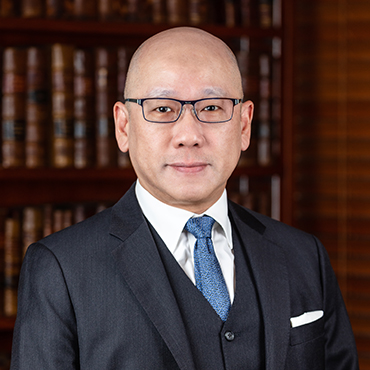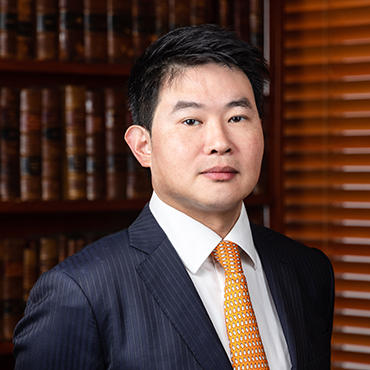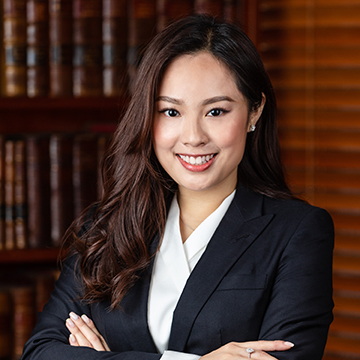Lai Chee Ying v The Committee for Safeguarding National Security of the HKSAR [2023] 3 HKLRD 275, [2023] HKCFI 1382
Robert Pang SC, Steven Kwan, Albert NB Wong, Ernie Tung, Colman Li and Velda Yau represented the plaintiff / applicant in Lai Chee Ying v The Committee for Safeguarding National Security of the HKSAR [2023] 3 HKLRD 275, [2023] HKCFI 1382.
Following the Secretary for Justice’s unsuccessful appeals against Poon CJHC’s decision granting T, an overseas King’s Counsel’s application for ad hoc admission as a barrister to represent L, a defendant in a criminal trial facing charges including offences under the Law of the People’s Republic of China on Safeguarding National Security in the Hong Kong Special Administrative Region (NSL), the Chief Executive announced that he would submit a report to the Central People’s Government (CPG) and recommend that a request be made to the Standing Committee of the National People’s Congress (NPCSC) to issue an interpretation of the NSL, seeking to clarify the following question: “Based on the legislative intent and objectives of [the NSL], can an overseas solicitor or barrister who is not qualified to practise generally in Hong Kong participate by any means in the handling of work in cases concerning offence endangering national security?”.
On 30 December 2022, the NPCSC issued the interpretation in relation to NSL 14 and NSL 47 (the Interpretation). In response to the Interpretation, L filed an originating summons seeking, inter alia, a declaration that the Interpretation did not affect the decisions of the Chief Judge, the Court of Appeal and the Appeal Committee on T’s ad hoc admission (OS Proceedings).
From evidence adduced by the Department of Justice in the OS Proceedings it was revealed that the Committee for Safeguarding National Security of the Hong Kong Special Administrative Region (NSC) held a meeting on 11 January 2023 to discuss the implementation of the Interpretation, in which it decided that T’s proposed representation of L in the criminal case was contrary to the interests of national security and advised the Director of Immigration to refuse any fresh employment approval application that might be made by T (NSC Decision). The Director also confirmed that he would duly respect and implement the NSC Decision (Director’s Decision).
L applied for leave for judicial review against the NSC Decision and the Director’s Decision on the ground that they were ultra vires NSL 14 (the JR Proceedings). The OS Proceedings and the JR Proceedings were heard together. The parties agreed that the OS Proceedings depended on the outcome of the JR Proceedings and therefore oral submissions were only made in relation to the latter.
Held, dismissing both the JR Proceedings and the OS Proceedings, that:
JR Proceedings
Jurisdictional issue
- (1) Under the constitutional order of the HKSAR, the HKSAR courts’ jurisdiction was prescribed by the Basic Law and the laws of the HKSAR including, where applicable, a provision of the NSL as a national law listed in Annex III of the Basic Law. This was the constitutional norm of the HKSAR on delineation of the courts’ jurisdiction over cases concerning national security under the NSL. (See paras.17-25.)
Whether NSC Decision amenable to judicial review
- (2) In deciding whether the HKSAR courts had jurisdiction over the work of the NSC under NSL 14, the NSL must be read as a coherent whole, and other articles of the NSL must be examined. Reading NSL 12 and 14 together as a coherent whole, the duties and functions of the NSC under NSL 14 fell within the exclusive purview of the CPG having the overarching responsibility for the national security affairs relating to the HKSAR and therefore the supervisory power over the NSC was reserved to the CPG exclusively. It followed that the HKSAR courts were not vested with any role or power over such matters of the CPG because they fell outside the courts’ constitutional competence assigned to them under the constitutional order of the HKSAR (HKSAR v Lai Chee Ying (2021) 24 HKCFAR 33 applied). (See paras.27-35.)
- (3) The HKSAR courts had no training or expertise to deal with the duties and functions of the NSC and it was only logical for NSL 14 to exclude the work of the NSC from the courts’ supervisory jurisdiction by way of judicial review. This stood in contrast with NSL 40 which authorised the HKSAR courts to exercise jurisdiction over cases concerning offences under the NSL. (See paras.36-37.)
- (4) NSL 14 also expressly prohibited the disclosure of information concerning the work of the NSC. If the work of the NSC were amenable to judicial review, such information would be required to be disclosed and it would defeat the purpose of the confidentiality requirement. (See para.38.)
Whether ultra vires rule applicable
- (5) The common law rule of ultra vires did not apply because under the constitutional norm of the HKSAR the courts had not been vested with any jurisdiction over the work of the NSC under NSL 14 to begin with. (See para.41.)
NSC Decision
- (6) In any event, the NSC Decision was not ultra vires NSL 14. Admitting and accepting the expert evidence on the relevant Mainland Law to assist the Court in properly understanding the Interpretation by the NPCSC, the Interpretation had the same effect as the NSL as at the date when the NSL came into effect, therefore what it declared was what the law had always been. Since the Interpretation catered for the specific scenario where the HKSAR courts had not requested or obtained a certificate from the Chief Executive on the question under NSL 47, the NSC must make judgments and decisions on the question if T’s proposed representation of L might pose national security risks. It followed that the NSC Decision lay squarely within the NSC’s power under NSL 14 as interpreted by the Interpretation (Director of Immigration v Chong Fung Yuen (2001) 4 HKCFAR 211 applied). (See paras.45, 49-58.)
Director’s Decision
- (7) The Director’s Decision was a lawful exercise of his power in discharging the duty to safeguard national security under the NSL. No other grounds were advanced to dispute the said decision, therefore the challenge must fall together with the challenge against the NSC Decision. (See para.59.)
OS Proceedings
- (8) The Interpretation, the NSC Decision and the Director’s Decision now governed the subject matter of the ad hoc admission of T. The OS Proceedings thus became academic. (See para.61.)
[The above is excerpted from the headnote to the report in HKLRD.]





